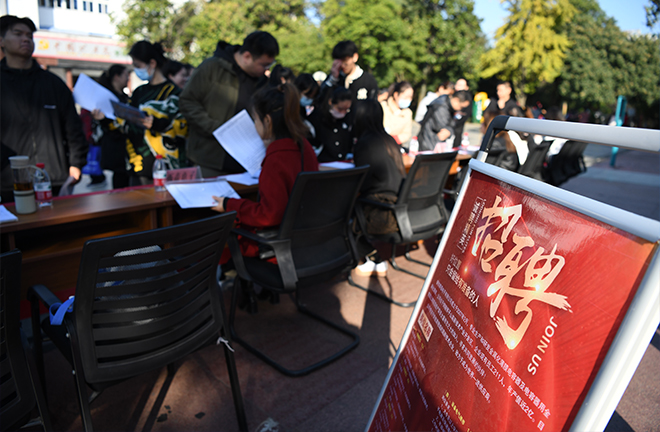Employment-first strategy pivotal to high-quality development

A job fair at a community in Tongguan District, Tongling, Anhui Province, on Nov. 8, aiming to improve the local employment service system Photo: XINHUA
The employment-first policy system represents a critical tool for advancing high-quality and full employment. By building on the valuable experience of previous proactive employment policies and continuously refining related frameworks through deepened reform, China can foster an employment-friendly development model. This approach will drive both qualitative improvements and reasonable quantitative growth in employment.
Essential to high-quality development
As General Secretary of the CPC Central Committee Xi Jinping said during the 14th group study session of the Political Bureau of the CPC Central Committee in May this year, promoting high-quality and full employment is the new orientation and mission of the employment work on the new journey in the new era. Achieving this directive requires persistent refinement of the employment-first policy.
The employment-first principle has evolved progressively, with increasingly rich and sophisticated connotations. Since the 18th CPC National Congress, China has adjusted its employment objectives in accordance with the changing demands of different development stages, providing robust and fundamental guidance, with the focus shifted from “more sufficient employment” and “higher-quality employment” to “higher-quality and fuller employment,” and now to “high-quality and full employment.”
This evolution has yielded tangible results. From 2012 to 2023, urban employment in China grew from 372.87 million to 470.32—an increase of 26%—accompanied by substantive improvements in employment quality. The push for high-quality and full employment conforms to the heightened demands of economic and social development at more advanced stages.
Employment, as the cornerstone of livelihood, plays a pivotal role in safeguarding and enhancing people’s wellbeing—a significance that remains evident and increasingly critical in the new era. Understanding the broader implications of employment for development forms the basis for implementing employment principles effectively.
Historically, when trying to make sense of the relationship between employment and economic growth, discussions often prioritized job creation through economic expansion. Over the long term, however, sustainable economic development relies on the full and effective utilization of all production factors. The effective allocation of labor, the most dynamic production factor in economic relations, is more crucial to economic development than many other factors. Therefore, high-quality development is inseparable from high-quality and full employment.
Implementing the employment-first policy aligns with China’s new development philosophy and facilitates the development of new quality productive forces, which are centered on substantial improvements in the total factor productivity (TFP). During the high-speed growth stage, China’s TFP gains were primarily driven by the optimized allocation of production factors like labor. As the socialist market economy has grown increasingly sound, the country’s factor allocation capacities have improved markedly.
At the stage of high-quality development, China will rely more heavily on scientific and technological innovation, as well as the application of its outcomes, to drive TFP growth. In addition, people, as the subjective and dynamic force behind innovation, are key to its success, with high-quality employment serving as the fuel for innovative activities. From the perspective of advancing the new development philosophy, transitioning to a more sustainable economic growth model and implementing the employment-first strategy ought to be significant components of achieving high-quality development.
Evolving employment strategies
During the 14th group study session of the Political Bureau of the CPC Central Committee, General Secretary Xi Jinping stressed stepping up the assessment of the impact of major policies, major projects, and distribution of major productive forces on employment, and promoting the coordination between employment policies and policies concerning fiscal, monetary, investment, consumption, industry, and regional development, so as to make them work in the same direction and provide an employment-friendly approach.
This has clarified the role of the employment-first principle in the implementation of the new development philosophy and pointed to basic directions for reforms in employment.
When examining the relationship between employment and development, it is generally believed that economic growth generates more job opportunities. Indeed, employment demand ultimately arises from job opportunities created by economic growth, but undeniably, any economy that aspires to achieve sustained growth should make full use of human resources, which is the vital theoretical foundation for implementing the employment-first strategy. China’s economic achievements have consistently demonstrated that the synergy between growth and employment is a catalyst for development.
When advancing economic and social development, China has always attached high importance to promoting employment, but making it a top priority went through a gradual deepening of understanding. In the early 21st century, large-scale layoffs caused by external economic fluctuations prompted the country to adopt a series of proactive policies to promote employment. By 2002, the basic framework for these policies had taken shape and was expanded and refined in subsequent years. In 2008, to mitigate the negative impacts of the international financial crisis on the domestic labor market, China introduced even more proactive employment policies, aligning them more closely with macroeconomic policies. Since the 18th CPC National Congress, the proactive employment toolbox has become increasingly robust, enhancing the country’s ability to manage complex situations effectively. This toolbox has played an increasingly prominent role in ensuring, stabilizing, and promoting employment.
China’s experiences underline that only by strengthening the employment-first orientation can the country synchronize economic development and job creation, economic and employment transformations, and high-quality development and high-quality, full employment, thereby ensuring stable, long-term employment prospects.
Du Yang is a research fellow and director of the Institute of Population and Labor Economics at the Chinese Academy of Social Sciences.
Edited by CHEN MIRONG
